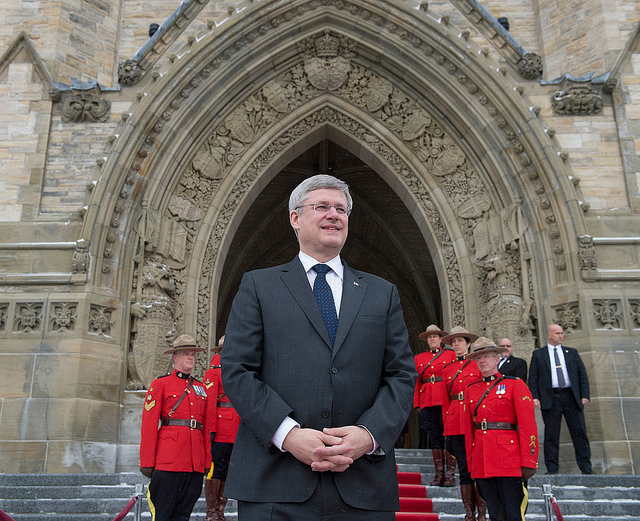Like this article? rabble is reader-supported journalism. Please chip in to keep stories like these coming.
The way things work in a subordinate capitalist society came to light in Hamilton last week. In an effort to bully its unionized workers, U.S. Steel revealed it was about to shift production from Canada to the United States, 75 cent Canadian dollar or not.
As Steve Arnold of the Hamilton Spectator reported, the company operating under bankruptcy protection got a court to affirm it no longer needed to pay agreed health and supplementary pension benefits owed USW members, or even pay municipal taxes.
In 2007 the Harper Conservatives approved the sale of the Canadian steel company Stelco to U.S. Steel, which not soon after began breaking its undertakings to preserve jobs and production at its Canadian sites in Hamilton and Lake Erie Works.
In 2011 the Conservative government signed a secret agreement with U.S. Steel Canada, and ended court action against the company to make it fulfill its obligations.
Before an Ontario court, the American owners get what they wanted, the Canadian steelworkers will organize to protect what they can, and in the middle of an election campaign where promises are made more often than not, the Canadian government has nothing to say.
In a democracy the alternate party system is supposed to protect citizens against arbitrary government. Most Canadians have had enough of Harper — a prime minister interested only in benefits for his party supporters — who put his own interest in holding office ahead of the public interest.
The election on October 19 should bring the demise of the Harper tyranny: no opinion survey shows the Conservatives coming close to winning a repeat majority.
The Harper Cons will either win fewer seats than another party, in which case the prime minister has said he will resign; or the NDP and the Liberals will deny a minority Harper government the confidence of the House of Commons the prime minister needs to hold power. Both parties have pledged to do this.
SFU Professor Andrew Heard has explained what could emerge: either a minority Liberal or NDP government negotiating with the opposition on an issue-to-issue basis, or an accord between two parties to adopt agreed policies (and support each other for a fixed period), or a formal coalition government.
The Liberals have made it clear they do not want to form a coalition government with the NDP. With a larger number of seats than the NDP, the Trudeau Liberals would be free to seek support from either the Conservatives or the NDP, depending on the issue under consideration.
The Liberals could pass legislation implementing the Trans-Pacific Partnership, for instance, with Conservative support, while decriminalizing marijuana with NDP support.
In Canada it is assumed that democracy is served when political parties aggregate various regional, religious, linguistic, social, economic, and cultural interests, and broker compromises among them.
Historically the Liberal party has won power more often than the Conservatives because of its superior ability to broker across linguistic lines. For long periods Canada looked more like a one-party state than a competitive party system.
In Europe it is common for parties to form around class divisions. The U.K. Tories represent professionals, owners, and other propertied people; Labour speaks for the salaried, waged, and the dispossessed.
In Canada both the Conservative and Liberal parties have traditionally worked to downplay, obscure, and conceal class differences, much like the Democrats and Republicans in the U.S. Canadians are “middle class,” capitalism is not mentioned, and the giant corporations that drive public policy keep as much out of sight as possible.
In business-dominated society, Conservative and Liberal governments alike operate like large companies. The PM is the CEO, and cabinet makes up the board of directors. Citizens get treated at best as clients, and at worst as non-unionized employees. Parliament is treated as mere theatre, except in a minority situation.
Instead of policy formation taking place in public debate and discussion, successive Liberal and Conservative governments have administered the country as if they owned it. One-party rule morphed into one-person rule, with Stephen Harper as Canadian local tyrant.
Prime ministerial government needs to be abandoned for a more open, transparent regime based on Parliament and its committees.
A favourable election outcome would see an accord between the Liberals and the New Democrats to implement a full employment strategy, repair broken social programs, restore public services, and innovate a climate justice policy.
Whatever the outcome, the role of the NDP members elected to Parliament should be to reflect the history and mandate of the party to represent working people and their families.
A good place to start would be at Hamilton and Lake Erie Works with action to protect employee pensions and benefits won by USW, now under attack from abroad by U.S. Steel.
Duncan Cameron is the president of rabble.ca and writes a weekly column on politics and current affairs.
Photo: pmwebphotos/flickr
Like this article? rabble is reader-supported journalism. Please chip in to keep stories like these coming.



